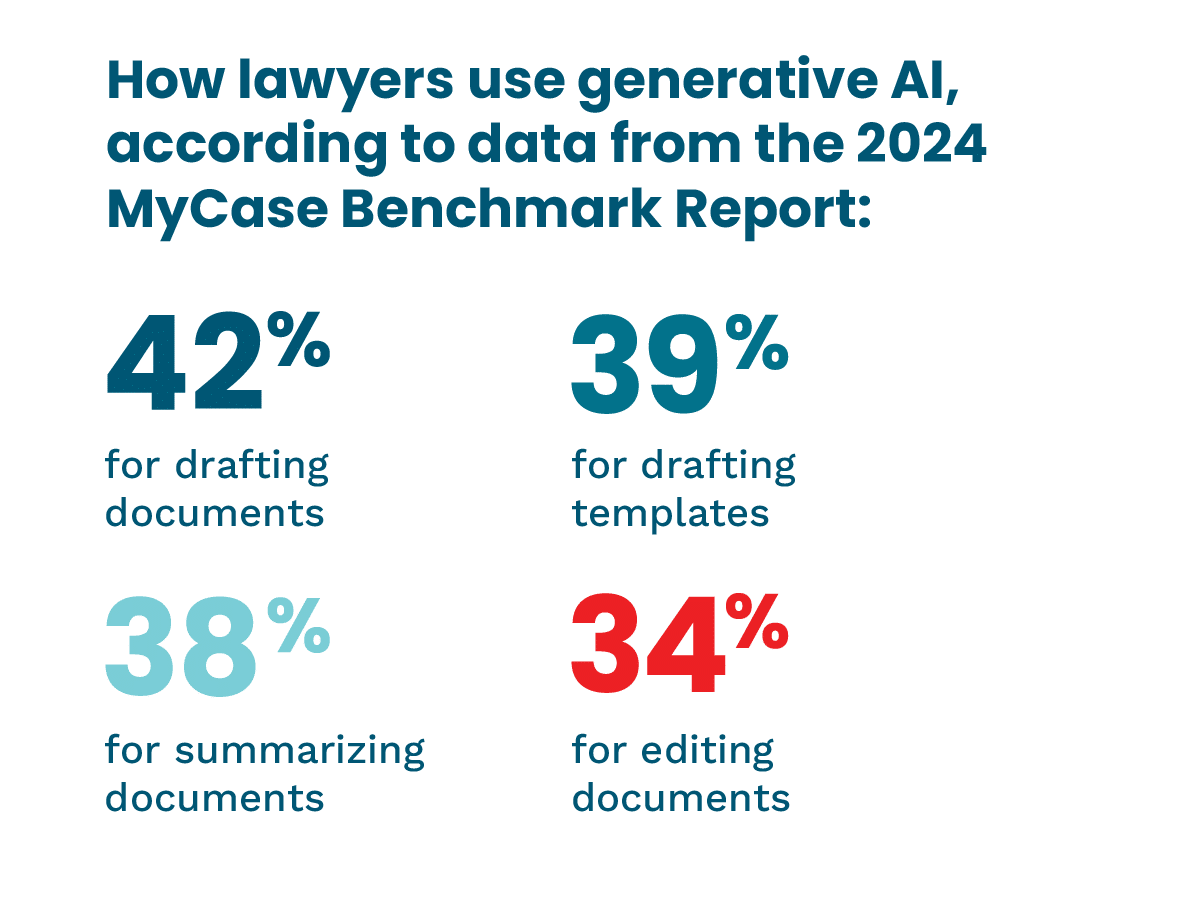The legal industry is currently experiencing a shake-up due to the latest advancements in artificial intelligence (AI), especially regarding document management and automation.
This isn’t just a step up from the usual—it’s a complete game-changer. Niki Black highlights this in her American Bar Association (ABA) article on document automation, stating that “the integration of generative artificial intelligence into legal software tools in the coming months represents more than simply marginal improvements; generative AI capabilities will fundamentally enhance the document assembly process.”
The evolution of AI for lawyers is setting the stage for a new era in legal work, one in which efficiency and precision are greatly enhanced. So, let’s explore how this tech is making a real impact in the legal world.
Problems Lawyers Face With Legal Documents
Legal professionals encounter numerous document assembly and management challenges that AI legal assistants and tools can alleviate. According to the 2024 MyCase + LawPay Legal Industry Benchmark Report, 81% of lawyers using AI report increased productivity. These challenges include:
These challenges include:
Too Much Time Spent Analyzing Documents: Lawyers often spend excessive time dissecting complex documents to extract pertinent information, a task ripe for Lawyer AI intervention.
Significant Amount of Time Spent Searching for Information: Locating specific information within extensive legal documents is time-consuming. Legal AI tools can streamline file management by quickly identifying relevant sections.
Inefficient Document Workflows: Traditional document management methods are often cumbersome and inefficient, leading to productivity and revenue losses.
Time Spent Changing Tone for Different Audiences: Adapting the tone of documents for different stakeholders is a meticulous process that AI can help streamline.
Redundant Back-and-Forth Client Communications: AI can reduce the need for repetitive communications by providing clearer initial drafts and automated follow-ups.
Repetitive Tasks Eat Up Time: Routine document-related tasks consume valuable time that could be better spent on higher-value activities.
Benefits of Using AI for Legal Documents
Embracing AI in legal document creation and analysis offers several transformative advantages. Let’s consider how this can impact law firms’ daily productivity.
Save Time Analyzing Documents
AI-powered tools enable rapid document analysis, significantly reducing the time lawyers spend on these tasks.
Get More Time to Invest in High-Value Work
By automating routine document-related tasks, lawyers can reallocate their time towards more strategic activities such as client consultation, case strategy development, and court appearances. AI for drafting legal documents ensures that routine tasks are handled efficiently.
Improve Communication With Your Legal Team and Clients
AI tools for lawyers can suggest clearer ways of explaining complex legal jargon or automatically generate summaries of lengthy documents to aid understanding for clients and team members. AI legal assistants help in crafting clear and concise communications.
How Lawyers Can Use AI for Legal Documents
AI technology can seamlessly integrate into various legal work aspects, enhancing efficiency and accuracy in multiple areas. Here’s a breakdown of how AI contributes to different legal functions.

Brief Drafting and Analysis
The drafting and refining process for legal briefs can be streamlined and simplified with AI. AI for drafting legal documents ensures these documents are comprehensive and specifically tailored to the case at hand by suggesting relevant precedents and constructing persuasive arguments. It can also analyze previous case outcomes and current laws to provide lawyers with the best possible foundation for their briefs. According to the 2024 MyCase + LawPay Legal Industry report, 42% of lawyers use generative AI for drafting documents, highlighting the significant impact of AI on improving the drafting process.
Document Management
In document management, AI tools utilize advanced tagging and categorization systems to efficiently organize and retrieve legal documents. This capability streamlines the search and access process, saving time and reducing the manual effort required to manage large volumes of documents. Legal AI tools can also track changes and control document versions to ensure all team members have current copies. The report indicates that 38% of lawyers use AI for summarizing documents, which further aids in efficient document management.
Document Automation and Assembly
By standardizing the creation of essential legal documents such as contracts, wills, and notices through customizable templates, AI saves time and minimizes the risk of human error. Legal document automation tools ensure documents adhere to the latest laws and regulations automatically, reducing the need for repetitive manual updates. AI for writing legal documents ensures accuracy and compliance with current legal standards. AI for writing legal documents ensures accuracy and compliance with current legal standards. Additionally, 39% of lawyers use generative AI for drafting templates, demonstrating its value in document automation and assembly.
Document Review and Analysis
AI enhances the document review process by quickly identifying key points and potential issues within documents, such as inconsistencies or clauses that require closer scrutiny. This capability is invaluable in managing large sets of documents during litigation or due diligence, where speed and accuracy are paramount. Lawyer AI can significantly reduce the time spent on document review. According to the same report, 34% of lawyers use AI for editing documents, showcasing its effectiveness in refining and perfecting legal content.
Selecting the right AI legal document software is critical for enhancing your practice's efficiency and security.
How to Choose AI Legal Document Software
Selecting the right AI legal document software is critical for enhancing your practice’s efficiency and security. Follow the steps below to ensure you choose a solution that meets your specific needs and integrates well with your existing systems.
1. Understand Your Requirements
Start by identifying your practice’s specific needs and challenges. Are you looking to streamline document generation, enhance document review, or improve document analysis? Knowing your goals will help you narrow down the options and select an AI tool that best meets your requirements.
For example, if your firm specializes in corporate law, you might prioritize contract review and compliance features. For a free version of AI tools, experiment with ChatGPT. Just make sure you check out our webinar on ChatGPT for Lawyers to learn more about how to use it effectively and, most importantly, securely.
Also, consider how flexible and customizable you need an AI solution to be. Legal documents can vary significantly, so the AI tool should be able to accommodate various document types, formats, and language specifics. It’s also beneficial to look for platforms that support playbooks, allowing you to customize inputs at scale.
To Put It Simply:
Identify the specific needs and challenges of your practice.
Select software that offers the most relevant features for your area of law (e.g., contract review for corporate law).
2. Conduct Extensive Research
Exploring and comparing different AI tools for functionality and user experience is important. Consider requesting demonstrations or trial periods to evaluate the software under real-world conditions. This will give you a firsthand look at how the tools perform and whether they meet your expectations.
To Put It Simply:
Explore and compare different AI tools for functionality and user experience.
Request demonstrations or trial periods to test the software under real-world conditions.
3. Consider Integrations with Your Existing Tech Stack
Ensure the AI solution integrates seamlessly with your current systems for smooth workflows. This includes checking for compatibility with critical tools like email and client management systems, which can facilitate easier document sharing and updates.
To Put It Simply:
Ensure the AI solution integrates seamlessly with your current systems.
Check for compatibility with critical tools (e.g., email, client management systems) to facilitate document sharing and updates.
Consider the Provider’s Reputation and Security
Opt for a provider known for reliability and robust security measures. Look for certifications and security protocols that comply with industry standards to protect sensitive legal information. For example, MyCase offers SOC2 compliance and industry-compliant servers, ensuring that your data is handled with the highest security standards.
To Put It Simply:
Choose a provider known for reliability and robust security measures.
Look for certifications and security protocols that comply with industry standards to protect sensitive information.
MyCase IQ for Legal AI Document Automation
MyCase, the leading legal practice management software, recently launched MyCase IQ—cutting-edge generative AI tailored for the legal industry. As an AI technology tailored for the legal industry, MyCase IQ promises a range of specific benefits for lawyers to impact daily operations. The legal AI software features being incorporated into MyCase’s daily workflows include document summarization, which empowers the quick review of case documents through AI-generated summaries.
Summarizing documents with MyCase IQ enhances efficiency and saves time by allowing you and your team to preview the contents of any documents stored in MyCase without having to open the documents.
Looking ahead, MyCase IQ is poised to expand its capabilities with exciting future features like automated draft generation and language translation services. These enhancements are currently under development and promise to further revolutionize how legal documents are created and managed. While the full details of these upcoming features remain on the product roadmap, the potential for increasing document handling efficiency and broadening global accessibility is clear, marking an encouraging future for legal professionals using MyCase IQ.
The potential of AI to streamline operations and improve efficiency makes it indispensable for law firms looking to thrive.
Harnessing Legal AI For Greater Success
AI advancements in document management and creation are transforming the legal profession. By automating routine tasks and enhancing document automation and analysis, AI frees up time for legal professionals to focus on serving clients.
The power of AI to streamline operations and improve efficiency makes it indispensable for law firms looking to thrive. Staying updated with these advances allows legal practitioners to set the pace in the industry.
MyCase IQ is responsible GenAI embedded throughout our practice management software that offers an advanced suite of AI-powered tools designed to enhance the productivity and accuracy of legal professionals, including Intelligent Document Summary and Text Editing.
Explore how MyCase IQ can revolutionize your legal practice. Or start a free 10-day trial today to see how these advanced tools can enhance your legal practice.
About the author

Hannah DeFreitasSenior Content Writer
Hannah DeFreitas is a Senior Content Writer for leading legal software brands, including MyCase, Docketwise, CASEpeer, and LawPay—the #1 legal payment processor. She distills industry trends and data into strategic insights that empower legal professionals to streamline workflows, increase revenue, and gain a competitive edge.
